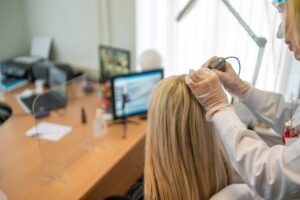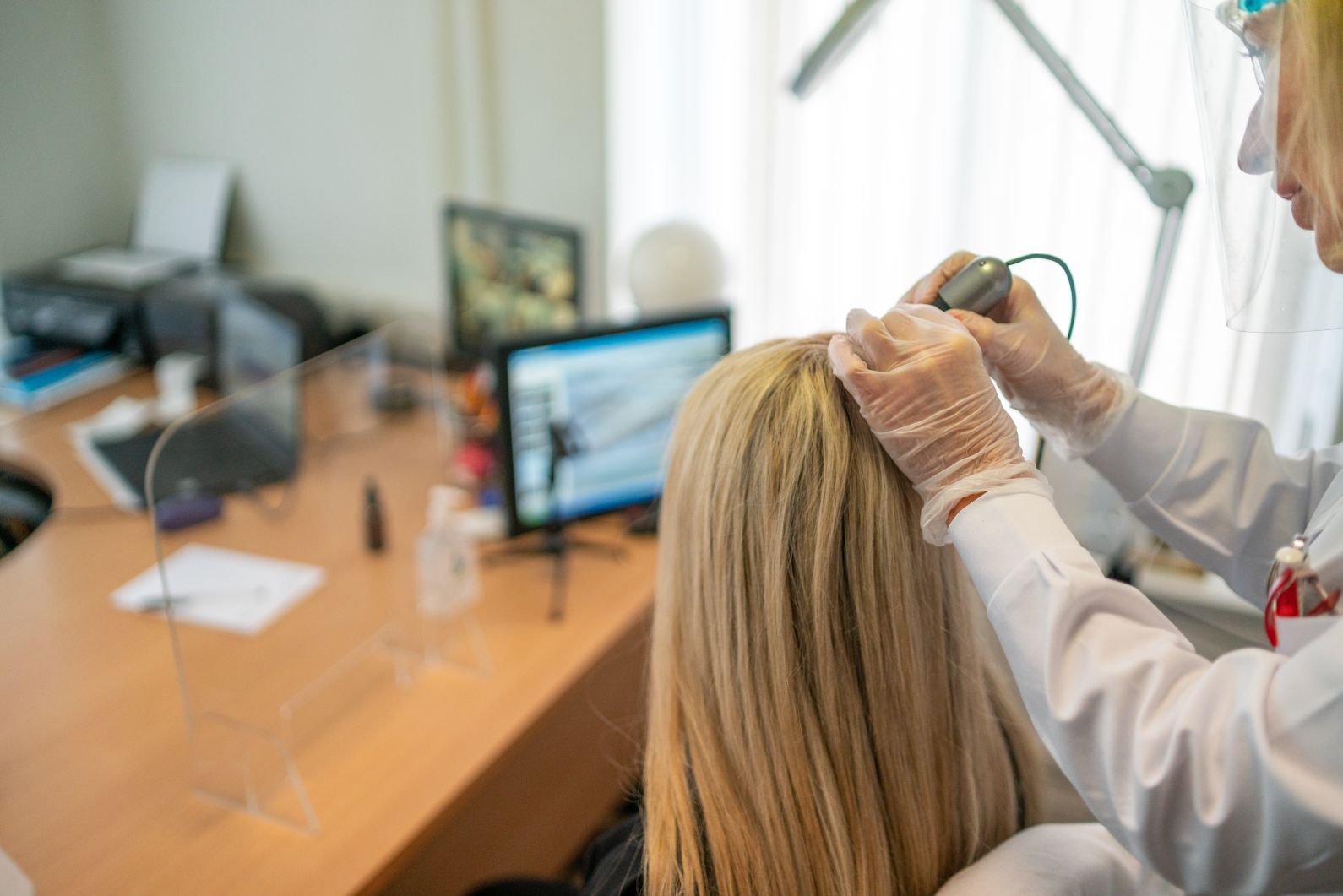You’ve likely encountered hairs on your brush or clothes and wondered if what you’re seeing is normal or a sign of a more significant problem. The line between hair shedding and hair loss can seem as fine as a strand of hair, but there’s important information that can clarify this common point of concern.
Read on to learn about their key differences from Dublin trichologists. We’ll also learn about tips on prevention and treatment from trusted Dublin trichologists.
Is It Hair Shedding or Hair Loss? What’s the Difference?
Hair shedding is often confused with hair loss, but they are not the same issue. The difference between hair shedding and hair loss can be subtle yet significant. But knowing this distinction is the first step towards maintaining a healthy mane.
Hair shedding refers to the natural and ongoing process where hair falls out and is replaced by new growth. In case you didn’t know, hair growth goes through a natural cycle which includes shedding. Each day, it’s perfectly common to lose 50 to 100 hairs as part of this process.
Hair loss, in contrast to shedding, may present as not only losing hair but also experiencing a failure in regrowth. Since hair is not growing back, hair loss leads to thinning or bald patches.
What Causes Hair Shedding and Hair Loss?
While hair fall is a normal process, certain factors can cause temporary increases in shedding. These include:
- Stress: Physical or emotional stress can push more hair follicles into the telogen phase, leading to temporary shedding. Once the stressor subsides, hair growth typically returns to normal.
- Illness: Fevers, certain medications, and illnesses like thyroid disorders can disrupt the hair growth cycle and cause temporary shedding.
- Hormonal Changes: Hormonal fluctuations, such as those experienced during pregnancy, childbirth, menopause, or starting/stopping birth control pills, can trigger temporary shedding.
- Dietary Deficiencies: Deficiencies in iron, vitamin D, or other essential nutrients can impact hair growth and contribute to shedding.
- Hairstyles and Hair Care Practices: Tight hairstyles like braids or ponytails can cause hair breakage, which can be mistaken for shedding. Harsh chemical treatments or excessive heat styling can also damage hair and lead to breakage.
Hair loss, however, can be caused by a variety of underlying medical conditions. Some examples include:
- Alopecia Areata: An autoimmune disease that causes patchy hair loss.
- Androgenetic Alopecia (Male/Female Pattern Baldness): A hereditary condition that causes gradual hair loss in a predictable pattern. This is one of the leading causes of hair loss in both men and women.
- Telogen Effluvium: A type of hair loss that occurs several months after a stressful event, illness, or significant weight loss.
- Scalp Infections: Fungal or bacterial infections of the scalp can cause hair loss in the affected area.
If the idea of hair loss concerns you, it’s important to understand which one you might be experiencing. Luckily, trichologists in Dublin are specialists you can turn to, ready to demystify the subject and guide you towards the best care for your locks.
The Fine Line: When Does Hair Shedding Become Hair Loss?
How can you tell if your hair shedding is a cause for concern? Here are some warning signs that might indicate hair loss:
- Excessive hair loss: Losing significantly large amounts of hair every day over an extended period is a sign of hair loss.
- Receding Hairline: In men, a receding hairline at the temples is a common sign of male pattern baldness. In women, hair loss may occur along the part line or in a widening pattern at the crown.
- Patchy Bald Spots: Circular or patchy bald spots are a hallmark of alopecia areata.
- Scalp Irritation or Scaling: Itching, burning, or redness of the scalp can accompany some types of hair loss.
- Sudden or Unexpected Hair Loss: Hair loss that occurs rapidly after an illness, significant weight change, or intense stress could be telogen effluvium.
The timing and pattern of hair loss can also be clues to the underlying cause. For example, sudden hair loss all over the scalp might point towards a different cause than a receding hairline that develops gradually over time.
Simply put, a certain amount of hair shedding is considered normal. When you notice a few strands on your hairbrush or in the shower, it’s usually not a cause for alarm. The problem arises when you start to notice substantially more hair coming out, especially if it leaves bald patches or you can visibly see your scalp more than before.
How Dublin Trichologists Can Help With Your Hair Fall Problems
If you’re experiencing hair loss, it’s wise to seek professional help from a trichologist. Trichology is the scientific study of the hair and scalp. Trichologists are trained to diagnose hair loss conditions and recommend appropriate treatment options.
Unlike a self-diagnosis based on Internet searches, trichologists are trained to go beyond the basics. During a consultation, they will delve into your medical history, family background of hair loss, and current medications.
Additionally, Dublin trichologists don’t stop at conversation. They utilise advanced tools for a deeper analysis. For example, at the Universal Hair & Scalp Clinic, they use Trichoscan (microscopic hair & scalp digital camera technology) for magnified views of your hair follicles and scalp. In some cases, blood tests or scalp biopsies might be recommended for a deeper analysis.
The comprehensive diagnostic approach helps them determine whether you’re experiencing normal hair shedding or a more serious case of hair loss.
It is worth mentioning that trichologists do more than diagnose excessive hair shedding. They can partner with you to create a personalised treatment plan targeting the root cause of your hair loss, not just the symptoms. This plan might combine medications, laser therapy, and adjustments to your hair care routine and diet.
Additionally, throughout the hair loss treatment process, these specialists offer ongoing support, monitor progress, and adjust the plan as needed. With their expertise and your commitment, you can achieve healthy hair growth and regain confidence.
How to Treat and Prevent Excessive Hair Fall
Hair loss or excessive shedding can feel like a never-ending battle. But with the right strategies and understanding, it’s a fight you can win. By incorporating daily hair care tips, making lifestyle adjustments, and choosing the right treatment options, you can make significant strides toward healthier, fuller hair. Here’s how to arm yourself in the fight against hair loss.
Daily Hair Care Tips
Prevention is your first line of defense. A few daily adjustments can significantly reduce unnecessary shedding:
- Gentle Handling: Avoid tight hairstyles that pull on the hair at the roots (like tight ponytails, braids, or buns) which can cause traction alopecia. Opt for loose, comfortable styles instead.
- Proper Washing: Use a sulfate-free shampoo to cleanse your scalp and hair gently. Over-washing can strip your scalp of essential oils, leading to dryness and potential hair loss.
- Conditioning: Apply conditioner to the lengths and ends of your hair, avoiding the scalp to prevent build-up that can clog follicles.
- Low Heat: Minimize the use of heat styling tools which can weaken hair strands, leading to breakage and loss. If you must use them, apply a heat protectant spray beforehand.
Lifestyle Changes for Healthier Hair
Your hair reflects your overall health, so it’s crucial to nurture your body from the inside out:
- Balanced Diet: Incorporate a diet rich in protein, vitamins (especially A, C, D, E), minerals (like iron and zinc), and omega-3 fatty acids to support hair growth.
- Stay Hydrated: Dehydration directly impacts your hair growth, making drinking plenty of water throughout the day essential.
- Stress Management: High stress can trigger hair shedding. Adopt stress-reduction techniques like yoga, meditation, or regular exercise.
- Adequate Sleep: Aim for 7-9 hours of sleep per night to allow your body to repair and regenerate, including your hair follicles.
Over-the-Counter vs. Professional Hair Growth Treatments
While there are numerous over-the-counter (OTC) products promising hair loss solutions, understanding when to consider professional treatment is key:
- OTC Treatments: Products which are FDA-approved for hair loss treatment and can be effective for some individuals. Natural supplements and vitamins for hair growth can also be beneficial but do your research and consult a healthcare professional before starting any new supplement regimen.
- Professional Treatments: For persistent or severe hair loss, professional treatments under the guidance of a dermatologist or trichologist can offer targeted and effective solutions. These may include Platelet-Rich Plasma (PRP) therapy, laser therapy, or prescription medications specifically formulated for hair regrowth.
Ultimately, through a proactive approach encompassing daily hair care, lifestyle adjustments, and the judicious use of treatments, it’s entirely possible to combat hair loss and excessive shedding. Remember, the key to winning any battle lies in understanding the challenge and deploying the right strategies—hair loss is no different.
In conclusion, the difference between hair shedding and hair loss is crucial for maintaining and nurturing a healthy head of hair. While shedding is a part of the natural hair growth cycle, hair loss could signal underlying health issues needing professional attention.
If you’re worried about persistent hair shedding or loss, it’s best not to self-diagnose. Consult with a trichologist in Dublin instead. With their expert guidance and advanced diagnostic approaches, they can help you differentiate these conditions and address your specific needs.
Armed with the right information and professional support, you can take proactive steps to prevent unnecessary hair loss and maintain your hair’s health. The journey to understanding and treating hair conditions may seem daunting, but it’s a comforting thought that expert help is just an appointment away.
Still unsure if you’re experiencing normal hair shedding or something more? Don’t wait any longer! Dublin trichologists can provide expert advice and personalised hair loss solutions to get your hair health back on track. Call us today on +353 (0)1 679 3618 to schedule a consultation and take control before your condition worsens!
Royalty-free image supplied from Pexels as part of the SEO service from 3R





